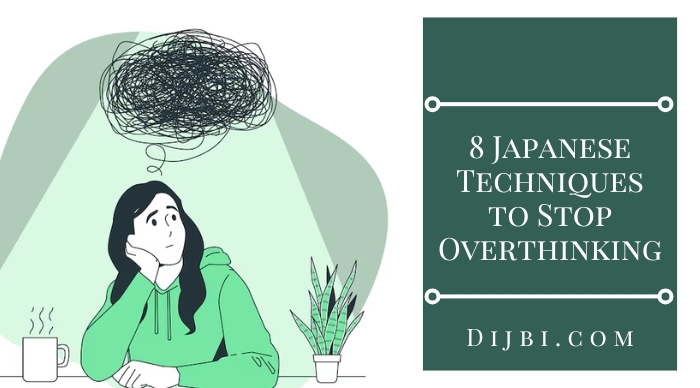8 Japanese Techniques to Stop Overthinking

Someone who overthinks has the experience of mulling over something indefinitely, often leaving a stressful and perpetually stuck feeling. Centuries-old traditions and philosophies from Japan offer easy-to-follow, effective ways to calm your mind and put things in their proper place. When you do these methods, you are practicing mindfulness, balance, and releasing what is unnecessary.
Overthinking is a common issue that most people face every day, so if you are overthinking, you are not the only one. Happily, there are a few Japanese methods that can assist you in clearing the mental fog and achieving the rest and solitude you need. Integrating these methods proven throughout the centuries will bring balance to your life and allow you to regain control of your thoughts. In this post, we’ll cover each of these techniques in depth and how they might be used to benefit your mental health:
1. Ikigai
A Japanese term meaning “reason for being” is a concept that can help you to live a more purposeful and fulfilling life. By recognizing what is at the center of a nexus comprised of four elements—your love (which you find to be your passion), your mission (what the world needs), your gathering (what you get paid for), and your vocation (what you are good at)—this practice encourages you to zero in on what is truly meaningful.
Ikigai brings you to the intersection of these elements to help you cut away the noise and put your energy where it matters. Avoid distractions, focus on the aspects that resonate with your essential values, minimize unnecessary overthinking, and bring balance into your life. This not only helps clear the mind but also enhances overall wellness, making this a solid method for getting out of a mental fog.
2. Kaizen
Kaizen is a Japanese philosophy dealing with the processes of continuous improvement. Kaizen discourages paralysis by perfectionism and the tendency to become overwhelmed by goals too big to achieve. By doing so, it gives you small actionable steps to take rather than feeling overwhelmed by the act of overthinking too much.
When you continuously take small steps towards your goals, you go from insecurity to celebrating progress. The continuous forward motion breeds productivity and conditions your mind to seek to grow instead of focusing on things standing in your way.
Whether it is your pursuit for personal development, professional success, or going through your day-to-day challenges, Kaizen is an effective and only way for all to focus and achieve it for the long run.
3. Shinrin-yoku (Forest Bathing)
Shinrin-yoku (forest bathing) is all about getting out into nature to relax and clear your mind. Being in a forest or green space can often mean less stress and a clearer mind. Several scientific studies have confirmed that a walk among the trees, or simply among nature, reduces cortisol—the hormone responsible for stress—and relieves anxiety.
It is especially useful for breaking cycles of rumination and negative thinking. Nature is experiencing all its sights, sounds, and smells, keeping you grounded and calm in the moment. Taking a walk in a park, a hike in the forest, or just sitting underneath a tree, Shinrin-yoku offers an organic, healing way to empty the mind and maintain equilibrium as a world off kilter.
4. Zazen (Seated Meditation)
Zazen, which is the essence of Zen meditation, is an extraordinary meditation technique that allows you to focus on the present moment. Step 1: Find a calm, upright position and focus on your breath while mindfully observing your thoughts without judgment. The idea is not to stop thinking as a whole—on the contrary—but to release the unwanted thoughts that pop into your head during this process, which serves to create a state of mental clarity and calm.
You can change your body with time and patience, and Zazen will reprogram your mind to stop the circular thinking by focusing on something outside of your past regrets or future worries and back into the present moment. Meditation will help you become aware of how your mind reacts to life challenges; as you develop a meditative practice, you can learn to respond to difficult situations with more poise and a sense of calmness within you. Zazen can be either practiced for a few minutes a day or it can become part of a larger process of spiritual exploration; in both cases, it is a way of finding your path through the effects of things that shake your mental and emotional balance.
5. Wabi-sabi
Wabi-sabi, the Japanese philosophy of imperfection, is learning to embrace imperfection, impermanence, and the natural cycle of life. This mindset allows you to put down the burden of perfectionism and understand that mistakes, errors, and imperfections are merely part of the process of growing. It promotes a little more self-kindness + reiterates the idea that life’s messiness is, in fact, its kind of beautiful; that perspective, in turn, can ease a lot of overthinking.
That means accepting that not everything turns out the way you want and avoiding disappointment or anything else is where wabi-sabi invites the peace of the moment. It is about finding beauty in the cracks of life and releasing the weight on needing everything to be “just so.” This mindset allows for acceptance and inner peace, whether it is noticing the beauty in an imperfectly worn object or overcoming guilt from times when you feel you have fallen short, allowing your mind to free itself from needless concern.
6. Kintsugi
Its very essence is that of Kintsugi—the Japanese art of replacing missing pieces of broken pottery with gold and converting imperfections into beauty; into value. The idea behind this philosophy is that cracks and flaws are not undesirable things to hide but milestones worth celebrating in a journey involving resilience and development. The item that has been repaired becomes even more singular and valuable as it represents the beauty in deficiency.
Making your life into Kintsugi means seeing the obstacles, the missteps, and the failures as not something to be ashamed of or regretful about but rather opportunities to learn from, to grow, and to become more resilient. Rather than ruminating on what went wrong, you consider how adversity contributes to you becoming a better and more complex human being. This will help you to find your acceptance, stop overthinking, and help you find meaning in an imperfect life.
7. Haragei
Haragei is one of the distinct Japanese ideas that describe feeling other people’s emotions without verbal communication and connecting with them at a deeper level. It signifies emotional intelligence and reading between the lines, tone, body language, facial expressions, etc. When you practice Haragei, you become more in tune with others, feel less angst, and cruise more easily through social situations.
Trusting your gut instincts and developing your sense of when “the proverbial room is out to get you” can control such overanalysis or misinterpretation of conversations. You let go of overanalyzing every single word/action and focus more on the emotional experience of the interaction and trust your instincts more. That brings more clarity of communication, less room for misunderstanding, and aids better equilibrium in your thought processes; so, at times, Haragei can be akin to a balm, soothing a chattering mind.
8. Gaman
Gaman is a timeless Japanese value, which literally translates as: endure the seemingly unbearable with patience and dignity. This idea is about self-discipline, resisting temptation, and staying unflappable even in the worst circumstances. Gaman instills endurance and emotional resilience in you so that you can stop worrying endlessly and face the challenges with clarity.
Gaman is all about keeping a firm hand and moving ahead, instead of getting stuck in regret or thinking too much about a problem, especially when you have several pressing issues to deal with, in this refined art of not giving up ಕಥೆ ಗಯ್ಯರ್ to all that seems hard. This mentality not only alleviates the mental burden of overthinking but also instills a feeling of above-confidence in your ability to face whatever life throws at you. Gaman can change the way you deal with difficulties and lead you to a sense of tranquillity and meaning, even in difficult times.
Bring Japanese Methods For A Balanced, Calm Mindset
Integrating these powerful Japanese techniques into your daily life will assist you to decrease overthinking and make a more balanced, peaceful mind. Each method provides a different way of dealing with stress, improving clarity, and involving emotional stability in this busy world.
- Your ikigai guides you to find your purpose, align your energy with what you truly care about, and not waste time and energy on all the little distractions.
- Kaizen replaces the need to be perfect with the desire to be better through small steps every day.
- The method of shinrin-yoku allows you to connect to nature, strip away the stress, and ground your thoughts.
- Two, Zazen promotes mindfulness, allowing you to realize when other thoughts come into your mind and you have to stay more focused on the present time without running your brain somewhere else.
- Wabi-sabi teaches you to accept having flaws and see beauty in the imperfection of life
- Kintsugi turns flowers into seedlings, so that damage blooms into strength.
- Haregei refines your instinct and rescues you from just the surface emotions or from overthinking.
- Gaman cultivates patience and resilience, encouraging you to withstand the worst while remaining dignified and graceful.
Weaving these philosophies into your daily life, you develop a foundation of mental clarity, emotional stability, and lasting peace. Test out different techniques, start small, and see how such tricks can alter your mind.









